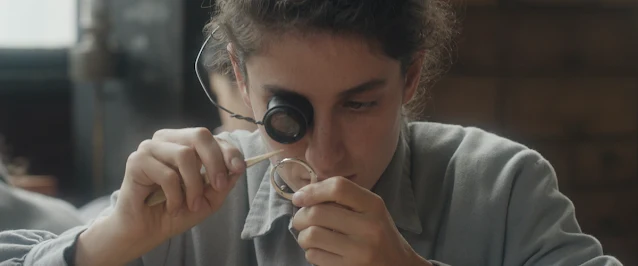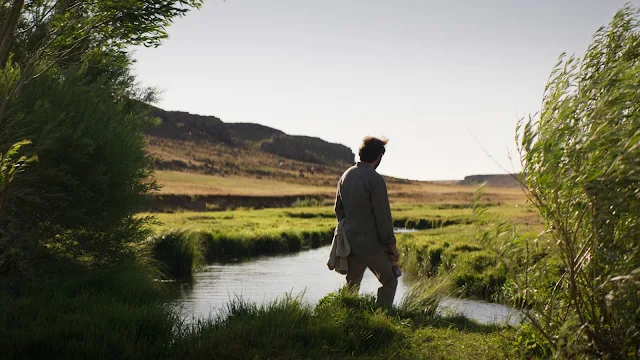 |
| Clara Gostynski in Unrest |
Cast: Clara Gostynski, Alexei Evstratov, Valentin Merz, Laurent Ferrero, Mayo Irion, Monika Stalder, Hélio Thiémard, Li Tavor, Laurence Bretignier, Nikolai Bosshardt. Screenplay: Cyril Schäublin. Cinematography: Silvan Hillmann. Production design: Sara B. Weingart. Film editing: Cyril Schäublin. Music: Li Tavor.
The portmanteau "docudrama" was coined to denote an attempt to depict an actual event in a medium for fiction. It's kind of an oxymoron, and as a genre it usually works only if the historical element and the artistic element balance each other. Cyril Schäublin's Unrest fails to do so. It dramatizes the visit of the anarchist Pyotr Kropotkin (Alexei Evstratov) to a watchmaking factory in Switzerland in 1877, seven years before the adoption of the Universal Time standard. So we learn that in Berne, where the film takes place, the railroad, the municipality, and the telegraph office each ran on a different clock. You might call this anarchy, but it's a different kind of anarchy than the movement espoused by Kropotkin is concerned with, which centers on the rights of workers, including the ability to govern their work. The watchmakers of Berne, of which Josephine Gräbl (Clara Gostynski) is one, are suffering from the abitrariness and micromanaging of the company, which is determined to improve the efficiency and productivity of the workers, who do labor that demands patience and concentration. So the film has a lot to chew on, from the process of watchmaking to the political struggles of the day to the nature of time itself. Unfortunately, Schäublin also wants to experiment with cinematic technique and likes to savor moments at the expense of forward narrative drive. He seems to expect us to do the work of putting together the historical background while savoring the beauty of his images. He likes, for example, to frame scenes with the characters at the bottom of the screen and sometimes at its corners. Josephine and Kropotkin serve as the central characters to help lead us through the maze of history and ideas with which the film deals, but we often lose sight of them. In short, it's a tantalizing but chilly movie that only a dedicated cinéaste could really love.













